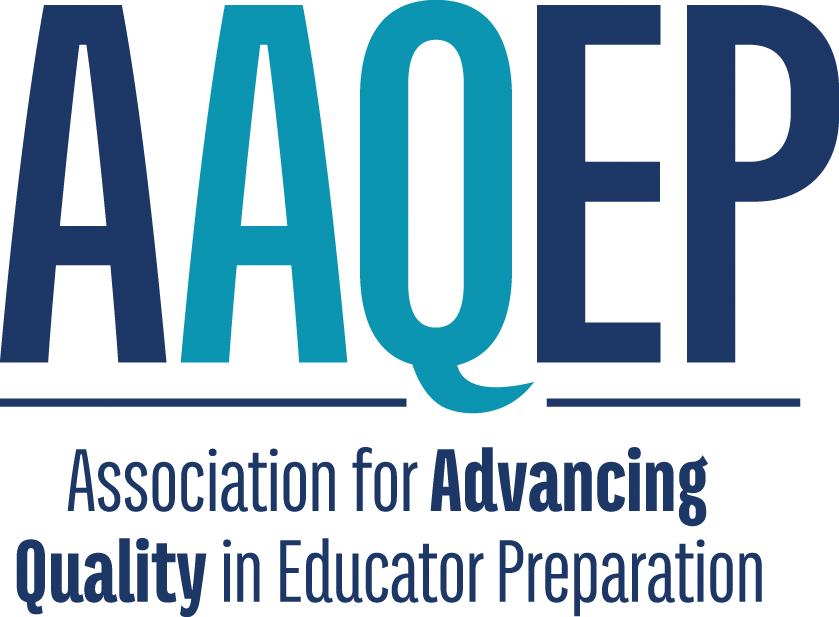Felician University’s Teacher Education Program Accreditation
The Felician University School of Education is a member in good standing of the Association for Advancing Quality in Educator Preparation (AAQEP). The School of Education is in the accreditation review cycle with a visit in fall 2022. Students in our Teacher Education Programs as well as those in all advanced programs strive to meet our program standards, grounded in the InTASC, AAQEP, and New Jersey Professional Standards for Teachers. Our rigorous assessment system begins in our students first course and is sustained throughout the entire program experience.
The School of Education Learning Outcomes
The School of Education Learning Outcomes
The School of Education at Felician University is committed to ensuring that our teacher education graduates have acquired the pedagogical and technological skills to accommodate all P-12 students’ individual needs and abilities. Graduates apply course content to clinical experiences to demonstrate effective and culturally and linguistically responsive teaching practices. Our teacher education graduates are caring, competent, compassionate, skilled, reflective, and dedicated educators who recognize respect, and have a deep understanding of the diverse needs of learners.
Our vision of effective teaching includes addressing the following:
Learner Development
- Designs and implements developmentally appropriate and challenging learning experiences to ensure an inclusive learning environment for all P-12 learners
Learning Differences
- Interacts with learners in appropriate manner with sensitivity that respects developmental, cultural, linguistic, and social differences, incorporates culturally and linguistically responsive content into the lesson that accounts for diversity of ability age, class, ethnicity, gender, language, race, religion, sexual orientation, and life experience
Learning Environments
- Uses effective classroom management techniques that support learner engagement and positive peer relationships
Content Knowledge
- Designs and implements lessons that demonstrate knowledge and command of the subject matter and facilitates the development of critical thinking and problem-solving skills within the content area
Application of Content
- Implements interdisciplinary learning activities that reflect content mastery and pedagogical knowledge and support the development of literacy and numeracy skills
Assessment
- Designs and uses appropriate formative and summative assessments that are differentiated and aligned with learning objectives. Provides meaningful and specific feedback to learners based on analysis of data
Planning for Instruction
- Designs and implements carefully sequenced, coherent lessons and units using a variety of instructional materials and resources, including technology.
Instructional Strategies
- Models metacognitive processes and questioning effectively to facilitate deep understanding of content to achieve learning outcomes
- Paces instruction effectively to achieve learning outcomes
Leadership and Collaboration
- Collaborates effectively with cooperating teacher(s), classroom support staff, specialists, and university supervisor
Professional Learning and Ethical Practice
- Formulates a philosophy of teaching that demonstrates caring, competent, compassionate and reflective practice that recognizes the dignity, diversity, and abilities of all P-12 learners
- Demonstrates effective reading, writing, speaking, mathematics, and technology skills, and provides evidence of reflection on improvement of professional practice in content area(s) and pedagogy
- Adheres to legal standards of practice to ensure students’ safety from sexually, physically, verbally, or emotionally harassing behavior by acting in a professionally responsible manner
- Exhibits positive, caring, compassionate, and appropriate personal and professional behaviors
AAQEP
The Association for Advancing Quality in Educator Preparation (AAQEP) has granted full 7-year accreditation to Felician University’s teacher preparation programs. Annual reporting provides a regular opportunity for all AAQEP members to update their program data and for accredited members to show that program quality is being maintained or enhanced and that AAQEP standards continue to be met.
Title II Summary Pass Rates
Completers of the Felician University Teacher Education Programs are successful on the Subject Area Praxis Exams at a 100% pass rate almost every year in the recent past.
| Group | Number taking tests | Number passing tests | Pass rate (%) |
| All program completers, 2019-20 | 17 | 17 | 100 |
| All program completers, 2018-19 | 16 | 16 | 100 |
| All program completers, 2017-18 | 23 | 20 | 87 |
| All program completers, 2016-17 | 21 | 21 | 100 |
| All program completers, 2015-16 | 36 | 36 | 100 |
Please click here to view the full report for the most recent or past academic years.
edTPA Pass Rates
The edTPA is a performance-based assessment completed by teacher education interns during Clinical Practice. The assessment is designed to measure a teacher candidate’s readiness to teach by focusing on three sections: planning, instruction and assessment that is completed by submitting a portfolio of artifacts created during Clinical Practice.
| Group | Number taking tests | Number passing tests | Pass rate (%) |
| All program completers, 2018-19 | 17 | 17 | 100 |
| All program completers, 2019-20 | 20 | 20 | 100 |
| All program completers, 2020-21 | 19 | 19 | 100 |
Please click here to view the full report for the most recent or past academic years.
Educator Preparation Provider Performance Reports
Graduates of the Felician University Teacher Education Programs are employed in NJ public schools at a high rate on par with their peers statewide. Additionally, state data show they positively impact P-12 learning, teach effectively in New Jersey public schools, and meet the expectations of their employers.
- 2018 New Jersey Department of Education Educator Preparation Provider Performance Reports – Felician University
- 2017 New Jersey Department of Education Educator Preparation Provider Performance Reports – Felician University
- 2016 New Jersey Department of Education Educator Preparation Provider Performance Reports – Felician University
- 2015 New Jersey Department of Education Educator Preparation Provider Performance Reports – Felician University
- 2014 New Jersey Department of Education Educator Preparation Provider Performance Reports – Felician University


